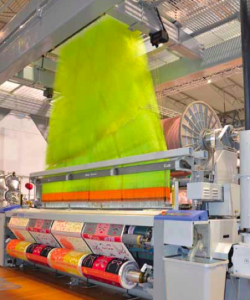Strategic thrust on energy saving, ecology
 In fiscal 2012 (ended March 31, 2012), the global economy began to recover gradually as certain Asian countries, especially China, witnessed an economic recovery and the US appears to have bottomed out. Despite the aftermath of the effects of the Japanese earthquake and the sharp appreciation of the yen, the Japanese economy also showed signs of an upturn due to such factors as the stabilization of personnel consumption and private sector capital investment.
In fiscal 2012 (ended March 31, 2012), the global economy began to recover gradually as certain Asian countries, especially China, witnessed an economic recovery and the US appears to have bottomed out. Despite the aftermath of the effects of the Japanese earthquake and the sharp appreciation of the yen, the Japanese economy also showed signs of an upturn due to such factors as the stabilization of personnel consumption and private sector capital investment.
In this operating environment, Toyota Industries Corporation and its group companies took efforts to strengthen the management platform by ensuring customer trust through dedication to quality as well as responding quickly and flexibly to the recovery trend and expansion of sales. In addition, Toyota Industries strove to minimize the impact on production due to the earthquake in Japan and the flooding in Thailand by carrying out flexible shift operations.
As a result, total consolidated net sales amounted to 1,543.3 billion yen, an increase of 63.5 billion yen, or four per cent, from fiscal 2011 (ended March 31, 2011). Here is a review of operations for the major business segments. Net sales of the textile machinery segment totalled 38.5 billion yen, a decrease of 4.2 billion yen, or 10 per cent. This was due mainly to a decrease in sales of air-jet looms in China. In February 2012, Toyota Industries purchased the shares of Uster Technologies AG and made it into a subsidiary for the purpose of strengthening the business segment.
In fiscal 2013, ending March 31, 2013, although the global economy is projected to gradually recover, uncertainties remain with regard to credit contraction, further deterioration in the employment situation and fluctuations in raw material prices such as crude oil, as well as concerns about exchange rate fluctuations. The operating environment in Japan is expected to remain severe.
Toyota Industries forecasts consolidated net sales of 1,650 billion yen, operating income of 85 billion yen, ordinary income of 93 billion yen and net income of 59 billion yen.
 With reference to medium to long-term management strategies, Toyota Industries will continue to undertake concerted efforts to strengthen its management platform and raise corporate value. As immediate tasks, it will also promote business and cost structure reforms to realize a solid management platform so that it can respond quickly to the changing market needs. Specifically, it will maintain a streamlined structure through the reduction of fixed costs and enhance its business in established markets in developed countries. In addition, it will accelerate its business expansion into rapidly growing emerging countries by thoroughly and meticulously monitoring market conditions in respective of regions and introducing products suited to the characteristics and needs of each market.
With reference to medium to long-term management strategies, Toyota Industries will continue to undertake concerted efforts to strengthen its management platform and raise corporate value. As immediate tasks, it will also promote business and cost structure reforms to realize a solid management platform so that it can respond quickly to the changing market needs. Specifically, it will maintain a streamlined structure through the reduction of fixed costs and enhance its business in established markets in developed countries. In addition, it will accelerate its business expansion into rapidly growing emerging countries by thoroughly and meticulously monitoring market conditions in respective of regions and introducing products suited to the characteristics and needs of each market.
Toyota Industries will also strive to establish production and supply structures to realize optimum product pricing and delivery, and to enhance the value chain to provide a wide range of customer services in each country and region.
Based on quality first, Toyota Industries regards giving considerations to the environment and safety as well as increasing its competitive strengths to be important issues to tackle over the medium to longterm. It will promote product development and advanced technology development to offer high value-added products that anticipate customer needs.
In October 2011, Toyota Industries formulated and announced the Vision 2020 and Medium-Term Management Plan that articulate action items for the next 10 years. In the Vision 2020, it aims to support industries and social infrastructures around the world by continuously supplying products and services that anticipate customers’ needs in order to contribute to engendering a compassionate society and enriching the lives of people around the world.
To this end, it will pursue the development of environmentally conscious, energy-saving products based on the key words of the 3Es – “energy,” “environmental protection” and “ecological thinking,” – while incorporating functions and services demanded by customers (value chain) and delivering them to the global market. Acting on these measures, it aims for growth in three business units, namely, “solutions” in the areas of materials handing equipment, logistics and textile machinery; “key components” in the fields of car air-conditioning compressors and car electronics; and “mobility” in the domains of vehicles and engines.
With regard to the Medium-Term Management Plan, the group has formulated a specific four-year activity plan for each business unit until fiscal 2016. The entire group will make a concerted effort to realize the Vision 2020. It will strive to nurture people who take the initiative to learn, think and act and who will enhance the power of the workplace.
In addition to placing top priority on safety, Toyota Industries thoroughly enforces compliance, including observance of laws and regulations, and actively participates in social contribution activities. Through these and further measures, it aims to meet the trust of society, raise corporate value and grow in harmony with society.